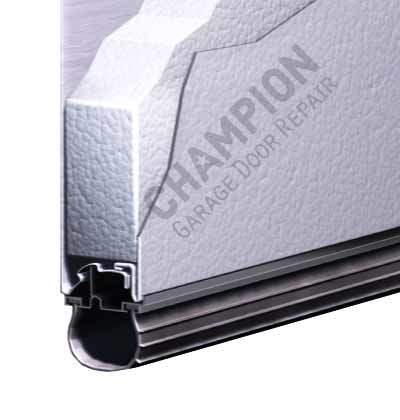As the world shifts towards a more environmentally-friendly lifestyle, eco-friendly products, including garage doors, have become more popular. Let’s take a closer look at what eco-friendly garage doors are, assess whether they are genuinely better for the environment, and examine their potential impact on our planet.
How Human Activities Affect the Environment
In a 2019 article, scientists worldwide declared a climate emergency, emphasizing the planet’s jeopardy due to rapidly increasing greenhouse gas emissions.

They stressed the importance of the public understanding how human activity, including those involved in garage door manufacturing, contribute to the harmful impact on the climate, illustrating significant changes over the past 40 years with data and charts.
Global Warming and Garage Doors
Garage doors indirectly contribute to global warming and climate change as their production materials, including steel, wood, and aluminum, rely on fossil fuels. In steel production, fossil fuels, especially coal, serve as both a source of energy and a reducing agent. Wood production depends on fossil fuels for logging, transportation, and processing, contributing to deforestation and elevated CO2 levels. In aluminum production, fossil fuels, particularly in electricity generation, are crucial, resulting in substantial carbon emissions. These processes collectively emit carbon dioxide (CO2), significantly contributing to greenhouse gas emissions and impacting global warming.
Key Features of Eco-Friendly Garage Doors
Eco-friendly garage doors manufactured with practices aiming to reduce energy and water consumption, mitigating the environmental impact associated with traditional manufacturing processes. Let’s break down the key features of eco-friendly garage doors:
- Materials: Eco-friendly garage doors are typically constructed using sustainable or recycled materials.
- Quality and Durability: A high-quality garage door can improve durability, reducing the need for frequent replacements and potentially reducing environmental impact.
- Energy Efficiency: With a decent R-Value, proper insulation and weatherproofing features, energy efficient garage doors effectively retain cold or hot air.
- Manufacturing Process: The manufacturing process of eco-friendly garage doors prioritizes environmentally friendly practices, covering design, sourcing, manufacturing, and transportation stages.
While eco-friendly garage doors are designed to minimize their environmental impact, it’s not a perfect solution, as the manufacturing processes still involve the usage of fossil fuels. However, these doors offer multiple benefits beyond sustainability.

Eco-friendly garage doors are typically insulated, helping to reduce energy consumption by maintaining stable temperatures inside the garage and home. Additionally, steel-back insulated garage doors tend to last longer, potentially reducing overall consumption.
How Recycled Garage Doors Affect GHG Emissions
Calculating the exact greenhouse gas emissions from recycled materials like steel, aluminum, and wood is a complex task without perfect scientific precision. The challenge lies in the limited availability of data on the life cycle of materials, making it difficult to accurately quantify their environmental impacts. Despite these challenges, various studies have been conducted to better understand how greenhouse gas emissions from recycled materials compare to those from new, virgin materials.
Let’s explore the results of a study conducted by the USDA Forest Service on the life-cycle energy and greenhouse gas (GHG) emissions for new and recovered softwood framing lumber and wood. The study found that the energy consumption in producing new softwood framing lumber and hardwood flooring was 6,440 and 7,750 MJ/m3, respectively, which is approximately 15 times higher in new wood production.
Additionally, over half of the energy used for new wood products came from biomass, totaling 4,360 and 3,880 MJ/m3 for softwood framing lumber and hardwood flooring. These findings show that the energy needed to manufacture garage doors from new wood is much higher than for garage doors made from recycled or reused wood sourced from existing products.
When it comes to metals, recycling materials for garage doors, openers, and springs does result in some greenhouse gas (GHG) emissions. However, research on the topic reveals that the recovery of scrap metals is consistently advantageous compared to producing new metals from virgin materials.
One of the primary reasons recycling is advantageous is the energy savings achieved through the process. The research found that recycling metals, such as steel and aluminum, leads to substantial reductions in greenhouse gas (GHG) emissions compared to producing these metals from scratch. Moreover, the GHG emissions released during the sorting process, which takes place at material recovery facilities (MRFs), were found to be relatively minimal.
For example, recycling aluminum requires 95% less energy compared to extracting it anew. Steel recycling saves 60% of energy production compared to manufacturing products from virgin materials. Additionally, using scrap steel leads to reduced mining waste and lower water usage. Producing new steel from recycled scrap utilizes 40% less water and generates a staggering 97% less mining waste.
Eco-Friendly Garage Doors for a Sustainable Future
In summary, mining metals and deforestation deplete finite land resources that cannot be quickly replenished. With 94% of natural resources used by Americans being non-renewable, recycling and choosing eco-friendly garage doors made from sustainably sourced materials like aluminum, steel, and wood are beneficial for conserving these valuable resources, reducing energy consumption, and greenhouse gas (GHG) emissions.







